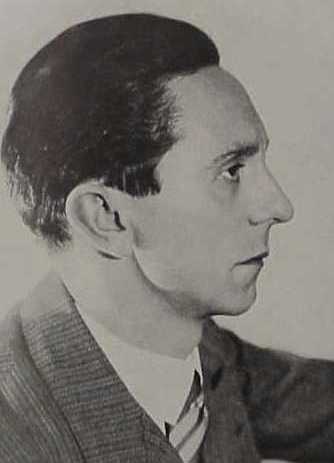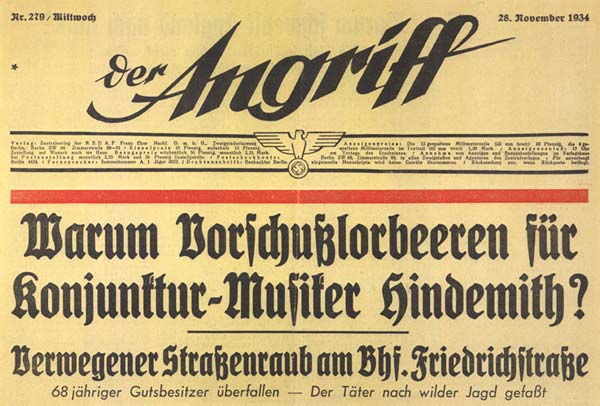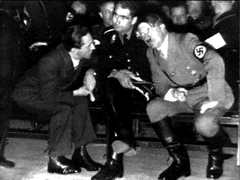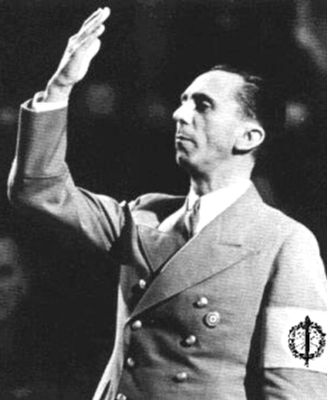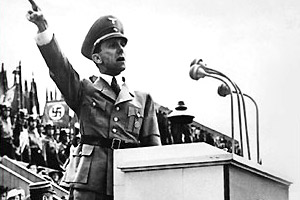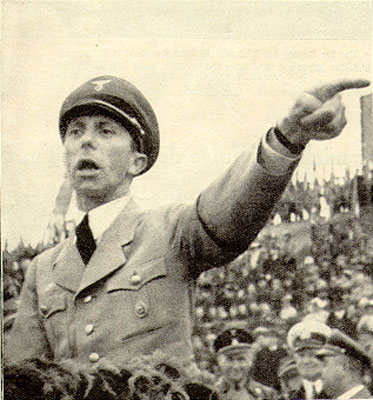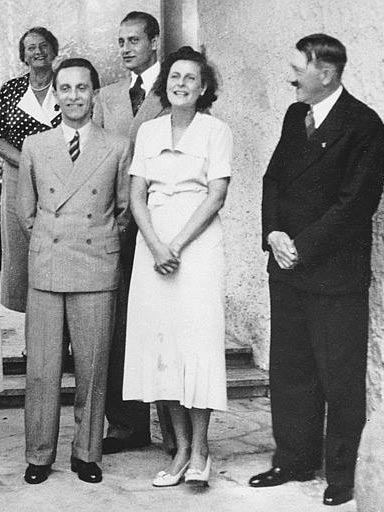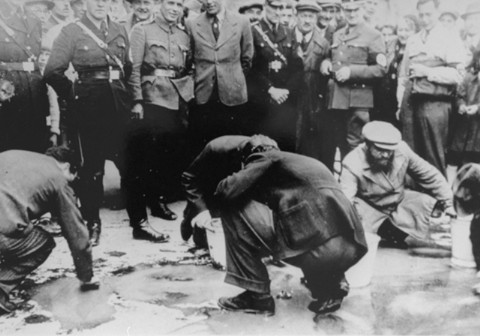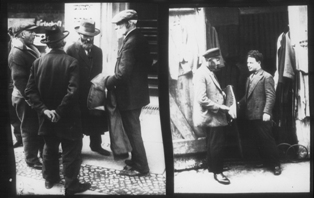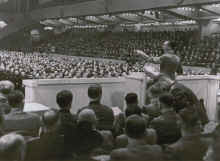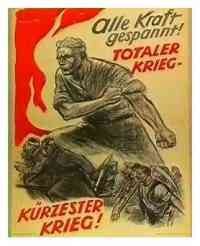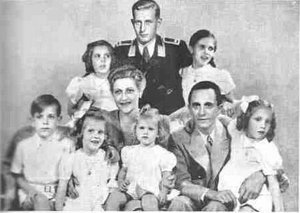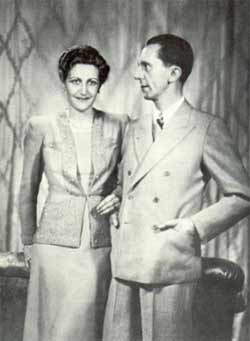Joseph Goebbels "The Poison Dwarf" 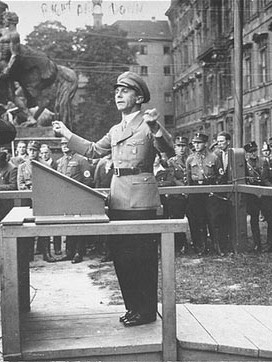
"If you tell a lie big enough and keep repeating it, people will eventually come to believe it. The lie can be maintained only for such time as the State can shield the people from the political, economic and/or military consequences of the lie. It thus becomes vitally important for the State to use all of its powers to repress dissent, for the truth is the mortal enemy of the lie, and thus by extension, the truth is the greatest enemy of the State.” -Joseph Goebbels |
|
Joseph Goebbels was born in Rheydt, Germany, on 29th October, 1897. He attended the established Heidelberg University where he was awarded a doctorate of philosophy in 1920. He had not served in the German Army during the First World War as he was disabled by a clubbed foot which hindered his ability to walk. This feeling of physical inferiority (Goebbels was self-conscious about his lack of height as well), his rejection by the German Army and the terms of the Treaty of Versailles lead to Goebbels becoming a very embittered man in the early 1920’s. He joined the Nazi Party towards the end of 1924.
He was soon after, appointed Gauleiter of Berlin and in this role, he put his propaganda skills to full use. A leading Nazi zealot he focused his energy combating the local socialist and communist parties with the help of Nazi media outlets backed up by the paramilitary thugs of the SA. By 1928 he had risen in the party ranks to become one of its most prominent members.
After the Nazis seized power in 1933, he was appointed propaganda minister. One of his first acts was to order the burning of books by Jewish or anti-Nazi authors at the Bebelplatz and he proceeded to gain full control of every outlet of information in Germany.
In Berlin, Goebbels was able to give full expression to his genius for propaganda, as editor of the Berlin Nazi newspaper Der Angriff he authored a steady stream of Nazi posters and handbills. He soon rose to become the city’s most feared agitator. His propaganda techniques were totally cynical: “That propaganda is good which leads to success, and that is bad which fails to achieve the desired result,” he wrote. “It is not propaganda’s task to be intelligent, its task is to lead to success.”
Following his appointment, his attacks on German Jews became ever fiercer and culminated in the Kristallnacht of 1938, the first open and unrestrained pogrom unleashed by the Nazis.
Whatever his motives, Goebbels took every opportunity to attack the Jews. Beginning in 1933 and continuing through his career, he was known as one of the regime’s most virulent anti-Semites. “Some people think,” he told a Berlin rally in June 1935, “that we haven’t noticed how the Jews are trying once again to spread themselves over all our streets. The Jews ought please to observe the laws of hospitality and not behave as if they were the same as us.”
The sarcastic “humour” of Goebbels’s speeches did not conceal the reality of his threat to the Jews. In his capacity as Gauleiter of Berlin, and thus as de facto ruler of the capital, Goebbels maintained constant pressure on the city’s large Jewish community, forcing them out of business and professional life and placing obstacles in the way of their being able to live normal lives, such as banning them from public transport and city facilities.
By mid 1938 Goebbels was investigating the possibility of requiring all Jews to wear an identifying mark and of confining them to a ghetto, but these were ideas whose time had not yet come. “Aim—drive the Jews out of Berlin,” he wrote in his diary in June 1938, “and without any sentimentality.”
Extracts from the speech: "The racial question & world propaganda" Nuremberg Rally 1933 History has never had a revolution less bloody, more disciplined and more orderly than ours. In attempting to deal with the Jewish question and to approach the matter legally for the first time in Europe's history, we are only following the spirit of the age. Defending against the Jewish danger is only part of our plan. When it becomes the only issue when National Socialism is discussed, that is Jewry's fault, not ours. It has attempted to mobilize the world against us, in the secret hope of winning back the territory it has lost.
This hope is not only in vain, it also carries with it a series of dangers and difficulties for Jewry itself. It cannot prevent arguments throughout the world not only against our policies, but also for them. The discussing has taken on an extent that both in the immediate and distant future could have extraordinarily unpleasant consequences for the Jewish race.
Richard Wagner once called the Jews the "plastic demon of decomposition" and Theodor Mommsen meant the same when he saw them as the "ferment of decomposition." In contrast, the Aryan sees himself as a creative creature. There may be a certain tragedy inherent in the nature of the Jews, but is it our fault that this race works destructively among the peoples and is a constant danger to their domestic and international security?
The fundamental differences between the two races were responsible for the repeated explosions during the November years [1918-1933]. As long as the Jews remain anonymous, they are secure. The moment they lose their anonymity, the racial problem became acute and required a suitable solution. We certainly do not hold the Jews solely to blame for the German spiritual and economic catastrophe. We all know the other causes that led to the decline of our people. However, we have the courage to recognize their role in the process, and to name them by name. It was difficult for a time to persuade the people of this, for public opinion was entirely in Jewish hands.
On a Berlin stage run by the Jews, a steel helmet bearing the words "Away with the filth!" was swept into the dust heap. The Jew Gumbel said the dead of the war had "fallen on the field of dishonor." The Jew Lessing compared Hindenburg with the mass murderer Haarmann. The Jew Toller said heroism was "the most stupid ideal." The Jew Arnold Zweig spoke of the German people as a "horde that needed to be unmasked," as the "animalistic power of the eternal Boche," and as a "nation of newspaper readers, a herd of voters, businessmen, murderers, marchers, operetta lovers, and bureaucratic cadavers." Is it surprising that the German Revolution also broke this unbearable yoke? When one further considers the alienation of German intellectual life by International Jewry, its corruption of German justice that finally led to the fact that only one out of every five judges was German, the takeover of the medical profession, their predominance among university professors, in short, the fact that nearly all intellectual professions were dominated by the Jews, one has to grant that no people with any self esteem could tolerate that for long. It was only an act of national renewal when the National Socialist revolution took action in this area.
People abroad often do not know the real causes of German Jewish legislation. The statistics are most persuasive. Nonetheless, we held back at the beginning of our work. We had more important things to do than to take on a question of such great scope. It is entirely the fault of Jewry that things turned out differently. The boycott and atrocity propaganda they made in other countries was an attempt by International Jewry to accomplish by means of public opinion in other countries what had been made impossible by our takeover in Germany. They attempted to cause difficulties for Germany's rebirth through a worldwide boycott campaign, and to render it ineffective.
We finally resorted to a counter-boycott during that critical period. The fact that their racial comrades still in Germany suffered loss is thanks to their racial comrades beyond our borders, who were trying to cause difficulties for us. They only caused economic difficulties for their own race. We can predict the future consequences for Jewry. We have not done anything to encourage them, they are simply the product of the times. Many clever Jews have already realized what they have done, above all to those remaining in Germany, who were the most directly affected. They shouted their warnings. But they could not overcome the radical wing, and in the end had to let things take their course for better or worse. This radical wing has delivered an extraordinarily hard blow to World Jewry and its allies. They put the Jewish Problem up for debate, and where it is debated the results can only be unpleasant. Jewry's strength is in its anonymity; if it loses that, the results can only be harmful.
The recent Zionist Conference in Paris shows the hopeless situation World Jewry has been driven into by its radical wing. When one of the various Jewish groups is no longer united, when there are only fruitless debates, it is a sign that Jewish power is on shaky ground. That is already beginning to have consequences for Jewry.
These events reveal the racial problem in all its difficulty. It will not fade away until Europe's peoples solve it. It will be solved when the people for their own good do what is necessary for their security.
- Joseph Goebbels |
Goebbels knew the power of controlling what people thought. Those that did not had to face the secret police. Those who were taken in by him were enthralled by propaganda films such as "The Eternal Jew" and "Triumph of the Will" which visually portrayed the might of Hitler and undying power of Germany skillfully directed by Leni Reifenstahl.
Goebbels delivered 12 such speeches on Adolf Hitler and National Socialism during the years 1933 - 1945. Including a series of articles covering topics on the role of women in Nazi Germany, US involvement in the war, and the ever popular "International Jewish conspiracy."
Once war began in September 1939, Goebbels began a steady process of extending his influence over domestic policy. After 1940, Hitler made few public appearances, and even his broadcasts became less frequent, so Goebbels increasingly became the face and the voice of the Nazi regime for the German people.[55] With Hitler preoccupied with the war, Himmler focusing on the “final solution to the Jewish question” in eastern Europe, and with Göring’s position declining with the failure of the Luftwaffe, Goebbels sensed a power vacuum in domestic policy and quickly moved to fill it.
Since civilian morale was his responsibility, he increasingly concerned himself with matters such as wages, rationing and housing, which affected morale and therefore productivity. He came to see the lethargic and demoralized Göring, as his main enemy. To undermine Göring, he forged an alliance with Himmler, although the SS chief remained wary of him.
The view of most historians is that the decision to proceed with the extermination of the Jews was taken at some point in late 1941, and Goebbels’s comments make it clear that he knew in general terms, if not in detail, what was planned.
The decision in principle to deport the German and Austrian Jews to unspecified destinations “in the east” was made in September. Goebbels immediately pressed for the Berlin Jews to be deported first. He traveled to Hitler’s headquarters on the eastern front, meeting both Hitler and Reinhard Heydrich to lobby for his demands. He got the assurances he wanted: “The Führer is of the opinion,” he wrote, “that the Jews eventually have to be removed from the whole of Germany. The first cities to be made Jew-free are Berlin, Vienna and Prague. Berlin is first in the queue, and I have the hope that we’ll succeed in the course of this year.”
Deportations of Berlin Jews to the Łódź ghetto began in October, but transport and other difficulties made the process much slower than Goebbels desired. His November article in Das Reich was part of his campaign to have the pace of deportation accelerated. Goebbels wrote in his diary on March 27, 1942: Beginning with Lublin the Jews in the General Government are now being evacuated eastward. The procedure is pretty barbaric and is not to be described here more definitely. Not much will remain of the Jews. About sixty percent of them will have to be liquidated. Only about 40 percent can be used for forced labour. The former Gauleiter of Vienna (Globocnik) who is to carry out this measure, is doing it with considerable circumspection and in a way that does not attract much attention…… the ghettos that will be emptied in the cities of the General Government will now be re-filled with Jews thrown out of the Reich. The process is to be repeated from time to time. In December, he was present when Hitler addressed a meeting of Gauleiters and other senior Nazis, discussing among other things the “Jewish question.” He wrote in his diary afterwards:
With regard to the Jewish Question, the Führer is determined to make a clean sweep of it. He prophesied that, if they brought about another world war, they would experience their annihilation. The annihilation of Jewry must be the necessary consequence. The question is to be viewed without any sentimentality. We’re not there to have sympathy with the Jews, but only sympathy with our own German people. If the German people has again now sacrificed around 160,000 dead in the eastern campaign, the originators of this bloody conflict will have to pay for it with their lives.
After the great defeat at Stalingrad in early February 1943, Goebbels was the first official forthrightly to acknowledge the seriousness of the peril that faced the nation and Europe, and frankly to concede that Germany could lose the war.
Probably the best known of his wartime speeches was his brilliantly crafted "Total War" address of February 18, 1943. Masterfully delivered to a large audience in Berlin's Sportpalast hall, it was broadcast on national radio and excerpts were shown in the weekly "Deutsche Wochenschau" newsreel.
Speaking in the aftermath of the Stalingrad catastrophe, Goebbels stressed the grim truth that catastrophic defeat was a real possibility, and concluded with a rousing call for national mobilization.
As the war dragged on, Goebbels' front-page editorial essays in the weekly paper Das Reich played an increasingly important role in sustaining public morale. They were widely reprinted and routinely read over the radio.
“We live at the most critical period in the history of the Occident,” he wrote in Das Reich in February 1943. “Any weakening of the spiritual and military defensive strength of our continent in its struggle with eastern Bolshevism brings with it the danger of a rapidly nearing decline in its will to resist… Our soldiers in the East will do their part. They will stop the storm from the steppes, and ultimately break it. They fight under unimaginable conditions. But they are fighting a good fight. They are fighting not only for our own security, but also for Europe's future.”
In July 1944 he was appointed General Plenipotentiary for Total War. With full authority to direct the civilian population and redistribute manpower even within the armed forces, Goebbels imposed an austerity program and pressed for ever greater civilian sacrifice. But with Germany already close to collapse, it was too late to accomplish anything beyond further dislocations and confusion.
In April of 1945, Hitler moved into the Führerbunker, located 50 feet below the Chancellery buildings in Berlin. There on April 22, Hitler exclaimed, the Reich was a failure and now there was nothing left for him to do but stay in Berlin and fight to the very end.
Goebbels then brought his entire family, including six young children, to live with Hitler in the bunker. On 30 April, with the Russians advancing to within a few hundred meters of the bunker, Hitler dictated his last will and testament shortly before shooting himself. Of Hitler's death, Goebbels commented: "The heart of Germany has ceased to beat. The Führer is dead."
At 8 p.m. on the evening of 1 May, Goebbels arranged for an SS doctor, Helmut Kunz, to kill his six children by injecting them with morphine and then, when they were unconscious, crushing an ampule of cyanide in each of their mouths. According to Kunz's testimony, he gave the children morphine injections but it was Magda Goebbels and Stumpfegger, Hitler's personal doctor, who then administered the cyanide. Shortly afterwards, Goebbels and his wife went up to the garden of the Chancellery, where they killed themselves.
Before, his death, it is said that Hitler gave to Goebbels his own wrist watch as a mark that he had been the only senior Nazi leader to have stayed with Hitler to the end.
Sources:
Who’s Who in Nazi Germany by Robert S Wistrich published by Routledge, London and New York 1995
Richard J. Evans, The Third Reich in Power Allen Lane 2005 The Holocaust Chronicle Publications International LTD Hitler Kershaw, Ian W. W. Norton & Company; 1st American edition. Doctor Goebbels: His Life & Death Roger Manvell and Heinrich Fraenkel Greenhill Books 2006 The Final Solution by G. Reitlinger – Vallentine Mitchell &Co Ltd 1953. USHMM
Copyright Carmelo Lisciotto H.E.A.R.T 2007 |

